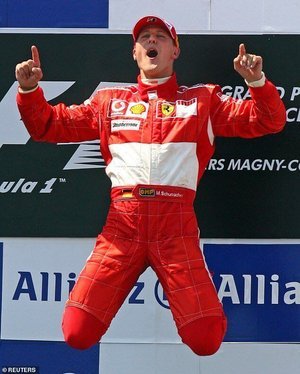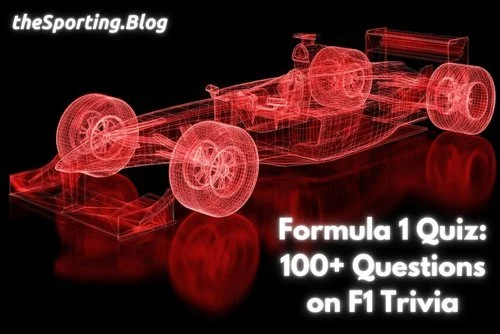The 10 Greatest F1 Drivers of All Time
The 10 Greatest Drivers in the History of Formula 1
772 drivers have entered a Formula 1 race weekend, 34 of which have achieved ultimate motorsport glory by claiming the world drivers championship.
But who is the greatest F1 driver ever?
Michael Schumacher - One of the greats
Hold onto your hats for this one, as we delve straight into the debate - who are the 10 best drivers ever to grace Formula 1?
The stopwatch never lies, but this list has been based on each driver’s holistic legacy, assessing their impact on the track and their wider contribution to the motorsport society beyond key statistics.
They compete for glamour, absurd prize money, and of course, sporting immortality.
Honourable mentions
First, a few honourable mentions!
Alberto Ascari, Graham Hill, Mika Hakkinen, Gilles Villeneuve, Nelson Piquet, Stirling Moss, Max Verstappen and Jack Brabham.
10. Sebastian Vettel
4 World Titles (2010-2013), 53 Race Wins
Vettel experienced a rapid rise to greatness, emulating his compatriot and hero Michael Schumacher.
A full-time driver by 2007, Vettel was F1’s youngest race winner in 2008 and its youngest champion in 2010, aged 23.
Three further titles followed, with dominant seasons in 2011 and 2013 especially evoking further comparisons with fellow German Schumacher.
Like Schumacher, Vettel was destined to join Ferrari, but a number of failed title challenges, showered with unforced errors, damaged his reputation in his later racing years and prevented him from surpassing a number of other drivers on this list.
In his younger years, Vettel was a ruthless operator that sometimes went too far.
He ignored team orders to overtake team-mate Mark Webber in Malaysia 2013, and deliberately swiped at Lewis Hamilton’s Mercedes under the safety car at Azerbaijan 2017.
Over time, Vettel’s combative attitude mellowed, but his meticulous attention to detail never waned.
The longevity of his contributions to team debriefs was infamous amongst the F1 fraternity right up to the end of his F1 career in 2022.
Vettel also became a huge ambassador for modern-day societal issues with relevance to F1.
A champion of LGBTQ rights and an environmental ambassador, he’s appeared on BBC Question Time and it will be fascinating to watch his next steps now he’s retired from racing.
9. Jackie Stewart
3 World Titles (1969, 1971, 1973), 27 Race Wins
The hard-talking Scot was the titanic force of the 1960s and early 1970s, and the first real off-track ambassador that pushed for changes to the sport in the interests of safety.
Stewart emerged with the BRM team in 1965, team-mate to the great Graham Hill.
A move to the Matra team, which became Tyrrell, proved decisive as he sauntered to three comfortable world titles in 1969, 1971 and 1973.
After being trapped in his car following a crash in 1966, from which he was rescued thanks to fellow drivers and a spanner from a fan, Stewart became the most outspoken voice for driver safety.
Its his influence in this regard that leaves an even greater legacy on motorsport than any race win or world title.
Improved barriers, compulsory helmets and seatbelts, and a comprehensive emergency service team are all areas which Stewart had to advocate for, often against a backdrop wider criticism from fellow drivers, fans and circuit owners.
Stewart retired as reigning World Champion, at the top of his game after 9 seasons.
If he had continued his career, perhaps he could have taken further championships and made a case to be higher up this list.
8. Fernando Alonso
2 World Titles (2005 & 2006), 37 Race Wins *
It is a travesty that Formula 1’s most experienced driver only boasts two world titles to his name.
A performer of supreme consistency and outright pace in any team, Alonso has time and again proven his ability to lift a car to positions it quite simply does not deserve to be.
His 2005 triumph was based on regular podiums, outscoring the quicker but unreliable McLaren of Kimi Raikkonen.
In 2006, he went toe to toe with a veteran Michael Schumacher, emerging the victor of a season-long battle.
He missed out on the world title in 2007, 2010 and 2012 by agonising margins - he is a mere 8 points away from being a five time world champion.
Alonso has been the victim of wrong place, wrong time on an unprecedented scale, leaving teams just as they become competitive.
However, the fiery Spaniard has to take some responsibility for his team choices.
His incredibly combative approach has seen him forced out of some teams, whilst on other occasions he’s grown impatient and left teams just as they’ve become quicker.
Aged 41, he shows no signs of slowing down just yet.
The great hope is that he can finally be provided with a race-winning car for the first time in over a decade and show his true value to the latest generation of F1 fans.
Check out our F1 Quiz!
7. Niki Lauda
3 World Titles (1975, 1977 & 1984), 25 Race Wins
As he was infamously dubbed by 1976 title rival James Hunt, ’The Rat’ is held dear by many for his incredible powers of recovery, and the longevity of his impact on the sport.
The gritty Austrian emerged with BRM and caught the eye of Enzo Ferrari, who brought him to Maranello for 1974.
Niki Lauda delivered a world title the following season.
Lauda’s 1976 story is documented in the Hollywood film ‘Rush.’
Leading the championship comfortably, he almost died in a crash at the Nurburgring, suffering third degree burns and inhaling fumes before he was pulled from the burning wreckage.
Determined not to lose out to Hunt, just six weeks later he was back racing in F1 and finished 4th at Monza, his balaclava covered in blood at the end of the race.
Lauda eventually missed out by a point to Hunt, but reclaimed his title the following year.
A fall-out with Ferrari followed and he retired in 1979 , but he returned three years later and took a third title in 1984 with McLaren.
Lauda remained heavily involved in F1 until his death in 2019, with major advisory and management roles with Ferrari and Jaguar.
He is also credited with a significant role in overseeing the all-conquering Mercedes team of the 2010s.
6. Alain Prost
4 World Titles (1985,1986,1989,1992), 51 race wins
France’s only world champion, ‘The Professor’, was a clinically efficient racer who took on and beat some of F1’s very best across generations with his smooth style.
A debut season with McLaren in 1980 was followed by a move to Renault a year later, where he soon became a race winner.
A return to McLaren saw him miss out on the title by half a point to team-mate Niki Lauda in 1984, before claiming back-to-back titles in 1985 and 1986.
Prost was force to adapt a somewhat out of character persona to fight against Ayrton Senna, who joined him at McLaren in 1998.
Desperate to claim the 1989 title after losing out to Senna the previous year, tensions boiled over between the two, with Prost eventually opting not to avoid a crash in Japan with his rival.
Both drivers were eliminated and with it Prost was able to claim the title.
Forced out of the team due to the animosity, Prost joined Ferrari but was pipped by Senna to the 1990 title, with the Brazilian driver getting his revenge by taking him out - once again at the Suzuka circuit in Japan.
Prost was sacked by Ferrari in 1991 for criticising the team, but a year’s sabbiatical was followed by a dominant 1993 season, where he romped to the title with Williams.
Prost then retired and ran a French F1 team under his own name from 1997 to 2001.
Under pressure from national government, the team failed to deliver on initial promises and folded under a cloud of financial challenge.
5. Jim Clark
2 World Titles (1963 and 1965), 25 Race Wins
An extremely rare ‘one team’ man, the Scottish farmer was a generational talent that was taken too soon.
Clark is iconic for his partnership with Lotus designer Colin Chapman, who designed the cars that took him to glory in two world championships.
A highly versatile driver, he also won the Indy 500 and finished third at Le Mans, just missing out on motorsport’s ‘Triple Crown’. He took part in NASCAR, Touring Car and other sports car races.
Clark was killed in a Formula 2 race in 1968, aged 32, and he would likely have taken further titles without such a tragedy.
As a result, it’s Clark’s admiration among his peers that raises him above other, more successful drivers.
4. Michael Schumacher
7 World Titles (1994, 1995, 2000-2004), 91 Race Wins
A relentless worker and supreme natural talent, Schumacher became motorsports’ pre-eminent figure in the 2000s through his dominance with Ferrari.
Before that came a one-off debut with Jordan in 1991, in which Schumacher impressed so much that he secured a race seat with the Benetton team for the next race.
It was soon apparent that he was a special talent, and he edged Damon Hill in a controversial 1994 drivers title, before claiming the 1995 championship in far easier style.
A move to Ferrari followed in 1996, who had failed to win the drivers title since 1979.
After coming close in 1997 and 1998, Schumacher prevailed in 2000 and embarked on the most dominant period in the sport, taking 5 consecutive drivers titles.
There was a time in the mid-2000s where a Schumacher win felt inevitable and many fans turned away from the sport - not good for its image, but nevertheless, his dominance can only be admired.
Schumacher retired at the top of his game in 2006, but made a shock comeback with Mercedes in 2010.
Whether it was the three years away from competition or the fact of age we’ll never know, but the result was that Schumacher was a shadow of the driver that had become the most successful driver of all time.
Without his distinctly average return to racing - in which he only took a single podium in three seasons - he may well have been higher in this list.
Schumacher’s ruthlessness also boiled over into outright cheating on multiple occasions, further damaging his reputation.
He deliberately crashed into Jacques Villeneuve during the final race of the 1997 season in Spain, whilst fighting for the World title.
In 2006, he deliberately made a mistake on his final qualifying lap whilst leading at Monaco, meaning that no other drivers could improve their lap time, and securing pole position.
3. Lewis Hamilton
7 World Titles (2008, 2014-2015,2017-2020), 103 Race Wins
The only black driver to ever race in F1, Hamilton has surpassed Schumacher as the most statistically successful driver in the sports history.
Ever since bursting onto the scene in 2007 with McLaren and missing out on the world title by a single point, he’s lit up the track in races across every season.
Yes, he’s had the most dominant car for at least 4 of his world titles, but Hamilton has time and time again proven that he’s capable of performances that few can even dream of delivering.
He’s always performed immaculately in the wet (one of the best indicators of natural talent), and managed to squeeze out podiums and race wins when presented with non-competitive machinery.
If it weren’t for a misapplication of the rules by the race director, Hamilton would have been the 2021 world champion, and now the outright leader for world championships.
Yet Hamilton’s legacy will be so much more than wins and titles.
He’s inspired a generation by proving that F1 doesn’t have to be a white, rich person’s playground.
He’s an outspoken ambassador for sustainability in motorsport, racial equality and LGBTQiA+ rights.
He’s also launched a report into the lack of diversity in all roles across motorsport, and created a charitable foundation to promote under-represented groups.
Aged 37, there’s no suggestion that he’s done just yet, so perhaps Hamilton has time to make a case to be even higher up the list through on and off track action.
2. Juan Manuel Fangio
5 World Titles (1951, 1954-1957), 24 Race Wins
The fact that Fangio’s number of world titles remained a record for over 45 years says an awful lot about his legacy.
The Argentinian won the title in five of seven full seasons he raced in, finishing runner-up in the others.
He also won the championship across four different constructors (Alfa Romeo, Mercedes, Ferrari and Maserati) - no other driver has won for more than two.
His win percentage of 46% is higher than any other drivers, which is truly staggering considering the reliability records of cars back in the 1950s.
Fangio was already 41 years of age when F1 became a sport (in 1950). How much could he have achieved if it existed in his 20s and 30s?
However, it’s not just the stats that make Fangio a genuine case to be the greatest driver of all time.
His most famous race is his last win in 1957.
Running over 45 seconds behind the leaders after a slow pit stop, Fangio broke the Nurburgring’s lap record in nine out of the following ten laps and took the lead on the very last lap.
1. Ayrton Senna
3 World Titles (1988, 1990 & 1991), 41 Race Wins
Almost 30 years on from his tragic death, Senna is widely considered the most talented driver ever to grace Formula 1.
The enigmatic Brazilian captured the heart of a nation through his boundless talent, aggressive style, unwavering passion, and desire to win no matter what the cost.
Many drivers have been labelled as rain-masters, but Senna is truly F1’s greatest driver in the wet.
His breakthrough drive came at Monaco in his rookie season, wrestling his uncompetitive Toleman to second in torrential conditions.
A move to Lotus for 1985 was the catalyst for a first race win in Estoril, again in the wet.
His first world title was secured at Japan in 1988, winning despite stalling his McLaren at the start and dropping to 15th. You guessed it - it was a wet race.
The greatest lap of F1 history also belongs to Senna in the wet.
At the 1993 European grand prix, he overtook four cars on the opening lap.
Like many of the other greats, Senna was a flawed individual, with ruthlessness getting the better of him.
After falling foul of political warfare in 1989 with Prost, he took matters into his own hands in 1990 and happily drove straight into the Frenchman at 130 mph in order to secure the world title.
Who knows how many titles he could have taken if things had worked out differently!
Senna was unfortunate to come up short against Prost in 1989 and he had non-competitive machinery in 1992 and 1993, which were dominated by the sophisticated Williams cars.
It was tragic that, once he finally got his hands on a Williams in 1994, he crashed at Imola and a piece of debris pierced his helmet.
Senna also leaves a huge legacy off track. He was a true patriot and cared deeply about addressing poverty in Brazil.
The Instituto Ayrton Senna was set up in his memory and it has provided an education to millions of Brazilian children.
Senna could find grip and time where others simply could not. He could take the car closer to the barriers, finding tenths of a second above the rest.
A combination of his raw talent and delivery of results edges him above the others by a fraction.



